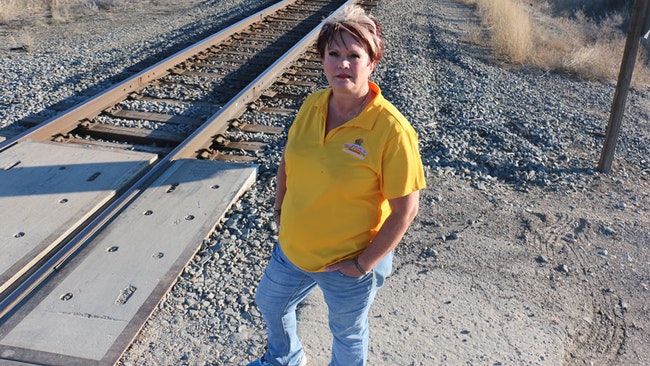
Robin Froerer, co-owner of Owyhee Produce, asked the county earlier this week to lift a gag on her operation that stipulates her family cannot speak about the rail reload project. The county board rejected her plea. (The Enterprise/Pat Caldwell)
NYSSA – Malheur County’s development company insisted again Tuesday that a Nyssa family remain gagged from speaking publicly about its rail reload project.
The unanimous vote on Tuesday, May 4, by the board of the Malheur County Development Corp. leaves in place an extraordinary requirement that the Froerer family keep silent to get up to $400,000 in help with an industrial road.
The decision, at a special meeting called just to consider the gag, came after farmer Robin Froerer described being forced by government representatives to accept the gag or forgo the financial help.
“If you say anything then the offer is off the table” is how she described the presentation of the provision to her family.
Froerer said she had the agreement of the Malheur County Court to strip the gag requirement from an agreement, but needed the development company’s board approval as well.
The controversial provision, first reported by the Enterprise last month, appeared in a pact over a railroad crossing dispute that banned Froerer’s family and business from speaking to media about any matter connected to the Treasure Valley Reload Center.
Froerer has been publicly critical of Greg Smith, the reload center project manager and director of the Malheur County Economic Development Department.
Malheur County officials needed to resolve the dispute to ensure the reload center could move ahead.
The contract condition reads: “Neither Froerer or any family member, nor related business entity shall make any statement to the local, state for federal media concerning the TVRC until after the project is completed and operating.”
The agreement, inked in March, revolved around a dispute between the Froerers, Malheur County and Union Pacific regarding the decision by the railroad to close the Gem Avenue rail crossing north of Nyssa.
The railroad intersection is at the northeast corner of the proposed rail center but was a crucial transit point for the Froerers and their farming operation. Froerer asserted the closure of the crossing severely her farm’s operation.
The Froerers farm a total of 4,000 acres – including 1,100 near the Gem Avenue crossing – and the closure of the crossing meant trucking their goods from their land several miles north to another railroad crossing.
The county and the Froerers each hired attorneys to solve the problem and the settlement between the county and the Froerers. Under the deal, the development corporation will use up to $400,000 from the reload center budget to build a mile-long access road for the Froerers.
Yet the provision to muzzle the Froerers from talking about the project proved to be contentious even before the ink was dry on the agreement.
At Tuesday’s meeting, Froerer said she felt it was her First Amendment right to “tell people about the things that have been said to us.”
“We as a family need to be able to present and talk to people about what has transpired,” said Froerer.
Froerer emphasized her family “never opposed this project.”
Randi Svaty, a board member and a manager at Northwest Farm Credit Services in Ontario, questioned Froerer why she agreed to the condition as part of the contract.
“Is there a reason there wasn’t opposition before this?” asked Svaty.
Froerer said “our hands were tied” on the matter.
“This project came to us and they said we will help you put the road in and possibly pay for an easement if you agree to a gag order. If you say anything then the offer is off the table,” said Froerer.
She said her family asked “numerous times” to have the provision jettisoned from the contract.
Board member Jason Pearson, director of onion sales for Eagle Eye Produce in Nyssa, said “obviously there was a reason” the gag was included. He said he saw no benefit to erasing the provision.
“What is the need in changing it? What guarantee do we have you don’t go right to the media?” said Pearson.
“What is the need to having it? I should be able to say the things said to us. I have a First Amendment right. Have you guys ever enforced a gag order on anyone?” replied Froerer.
Greg Smith, Malheur County Economic Development Department director and a member of the MCDC board, told Froerer he was “not the one who put” the provision for silence in the agreement.
“That was a negotiated agreement between the attorneys,” said Smith.
Froerer told the board she would “just like the gag order lifted. The county said they were willing to but we needed to get it from MCDC.”
Malheur County Judge Dan Joyce said last month he would drop the provision for silence “if requested by the Froerers.”
Grant Kitamura, president of the development company and the general manager and part owner of the onion packing facility Baker & Murakami Produce Co said he felt “under duress” to enter the deal as well, taking $400,000 from the reload project for the new road.
“The battle you actually have is with Union Pacific,” Kitamura told Froerer.
Kitamura said he saw no reason to “back track” on the agreement.
“We all agreed. We all signed it,” said Kitamura.
Kitamura, Pearson, Svaty and Corey Maag, owner of Y1 Farms and Jamieson Produce in Vale, voted to keep the provision.
Kay Riley, a partner in Snake River Produce, a Nyssa onion packing firm said in an email to the board he opposed the change as well.
The board was appointed by the Malheur County Court but operates independently.
After the meeting Froerer said she was “confused” by the decision.
“We were disappointed in how they voted. We have never been in opposition to the project so I don’t understand what the gag order is for,” said Frorer.
Joyce said Wednesday he wasn’t going to take any further action on the matter and he had no problem with the board’s decision.
“This was the agreement they came up with and everyone agreed to it. Time to move on,” said Joyce.
The provision for silence is unusual according to state officials. The state Justice Department, which oversees contracts involving nearly never state agency, said such a provision wasn’t part of its work. The state Transportation Department, which is funding the Nyssa project, said imposing silence wasn’t part of its contracting routine.
The provision for silence also isn’t routine for county contracts. Last month, Joyce said the county could not furnish any contract that contained such a limit on free speech for citizens or businesses.
Smith told the Enterprise in April that his agency had no records documenting the need for the Froerer’s silence. He also said his agency had no record that it ever used such a provision before – or that it even had examples of other contracts that did.
Jack Orchard, a First Amendment attorney who represents the Oregon Newspaper Publishers Association, said the contract provision may violate the First Amendment of the U.S. Constitution.
“Where a government benefit is conditioned on an applicant or beneficiary being prohibited, under penalty of breaching a contract, from disclosing information, I believe this is illegal as a government coercion of one’s freedom to speak,” said Orchard.
News tip? Contact reporter Pat Caldwell at [email protected]
Previous coverage:
Railroad opts to close Nyssa crossing, disrupting long-standing farm operation
SAFEGUARD YOUR LOCAL NEWS
Take one action today to help the Enterprise grow and do more for the community through accurate, fair reporting.
SUBSCRIBE: A monthly digital subscription is $5 a month.
GIFT: Give someone you know a subscription.
ONE-TIME PAYMENT: Contribute, knowing your support goes towards more local journalism you can trust.




